From Assoc. Prof. Dr. Zaho GOLEMI
Memorie.al / Our society need to learn the historical truths of the past, because; “without a past, there is no future.” Maliq Sadushi, well-known in military circles, wrote with courage and faithfully with the truths. He came from the war front, the front of the People’s Army’s establishment, the front of academic knowledge and leadership at the highest levels of the Albanian military leadership. He had known Mehmet Shehu for 40 years and wrote the truths he knew, leaving his creativity in the field of military historiography written and documented as a treasure.
Senior former military officers, but also the social circle that knew General Maliq Sadushi, as evidenced by what has been written and said by: Arif Hasko, Gjergj Titani, Eqerem Osmënaj, Neim Muho, Xhemil Çela, Piro Rexhepi, Neshat Tozaj, Namik Shehu, and many others, agree in the opinion that “Maliq Sadushi from Vajza of Vlora, a man of character, very sincere in what he told me about Mehmet. Maliqi was the former first Deputy Minister of Defense, thus the direct subordinate of Mehmet Shehu…”!
On the other hand, Maliq Sadushi knew well the fathers of human history, those who laid the cornerstone for history, such as: Herodotus, “the father of history,” the first true historian, but especially the first historian of war, Thucydides, (460 B.C. – 400 B.C.). His wide cultural horizon enabled Maliq Sadushi to put his clear thoughts on paper.
He overcame the “trouble,” of whether he would be able to accomplish this difficult undertaking. Meanwhile, General George Patton had left a valuable lesson: “to be a successful military man, you must know history,” while the philosopher George Santayana wrote: “those who do not learn from history are doomed to repeat it.”
Maliq Sadushi knew historians well from antiquity to our time, such as: Thucydides, Karl von Clausewitz, Henry Jomini, Hans Delbrück, and from the Albanians, Barleti and Mehmet Shehu, and many others. It is a fact that Maliq Sadushi, knowing well that “the history of humanity is the history of wars,” managed to write and publish: “The History of the Village of Vajza” (1981), “Perlat Rexhepi” (2000), “Our Good Village,” (2002), “From the Shores of the Ionian to the Mountains of Sanxhak,” (2004), “Those Who Are Not Forgotten” (2005), “Mehmet Shehu, as I knew him: memoirs” (2008) as well as dozens of articles in military press organs.
His books are not library ornaments, but deep thought, life experiences from the partisan war, the life of the village of Vajza, martyrs, victims of war, comrades of war and the army, the establishment of the new army of the people and for the people, and he has dotted the “i’s” without flinching for the former regime, for military values, for military abilities and skills, for the strong characters of statesmen who gave their lives, blood, and sweat to the foundations of the new Albania.
History, the Best Judge
Maliq Sadushi dared to write about the former Prime Minister Mehmet Shehu, about the truths of the last century, as he says; “as I knew him,” about the infamous “plot” of Mehmet Shehu and Kadri Hazbiu, even though his most preferred topic for memoirs is the National Liberation Anti-Fascist War.
In 250 pages divided into five chapters, Maliq Sadushi presents to the reader “Difficult Times,” “The National Liberation Anti-Fascist War,” “The Rise of the New Democratic State,” “Mehmet Shehu in the Optics of the LANÇ Leadership,” and “History Will Tell the Truth.”
It is a fact that, aware of his mission in life, Maliq Sadushi did not stay in the shadows and did not bypass the truths of the last century. That is why Maliq Sadushi dared to take up the pen and write in 2008, “Mehmet Shehu, as I knew him: memoirs.” He is clear, lucid, and convincing in his arguments. He wrote during the period when the greatest torrent of slander and reaction against him was like a stormy sea.
Military readers and others appreciated the book, and undoubtedly one of them was the reviewer of the book, Assoc. Prof. Dr. Gjergj Titani, a former senior military officer and political prisoner, who wrote: “… a book dedicated to one of the most distinguished figures of the War, the complex personality of Mehmet Shehu, with operational-strategic dimensions as a military man, and places him at the forefront of the golden necklace of the most distinguished general of the Albanian nation.
The book is a unique creation in its writing style, the chronology of facts, and its indisputable historical value. Writing about Mehmet Shehu is a civilized, extremely cultured, and courageous gesture, an intellectual achievement… for the military practitioner and theorist, a great scientist with a wide spectrum of knowledge and strategic dimensions…! The book is shocking sincerity and courage, for a very interesting figure that was intentionally and maliciously anathematized by the poisoned politics and propaganda of the time…”!
In the foreword, it also emerges that; “The elimination of Mehmet Shehu represents the peak of communist ferocity, the next blow in a chain that had no end in sight.” The Prime Minister was a polyglot, mastering the novelties of science as he knew English, Italian, Spanish, French, Russian, German, and Serbo-Croatian very well. He would surprise you with his knowledge of military problems, intelligence, counterintelligence, radio counterintelligence, political and technological espionage, diplomacy, etc.
Among other things, Gjergj Titani writes about Ramiz Alia’s statement that; “Mehmet Shehu had never been an enemy or a poly-agent of Albania”… even though it was a belated statement. The author, who is a general without rank, noticed his closest collaborator for his “wide culture, extraordinary, professional intuition, brilliant, positive, encouraging, and inspiring leadership skills…”! And yet, historiography has stated and will continue to state its opinion, about the time when the Prime Minister ruled Albania with an iron fist. History is the best judge.
“Mehmet Shehu ‘Did Well’ to Kill Himself”!… History Will Tell the Truth
The experience of the state and the highest leaders was also known for executions, as the author’s analysis of the event and the conclusions he draws, that; “he did well to kill himself,” as he eliminated the handcuffs, the investigation, the special trial, the unmasking, the execution by firing squad, and in the end a “lost grave.”
Fragments of Maliq Sadushi’s book: “…One thing is true to me (which I don’t want to believe), that Enver did not love Mehmet, or he loved him in the way he ended up…! The end of Mehmet Shehu does not have much glory; it was a tragic end that no one could have imagined. But his end has the courage of a man, of a fighter, of a comrade who had been betrayed by his comrades and who was betrayed by his comrades…!
Honestly, we also accept individual, but also collective, responsibility for allowing such situations. “If we draw a parallel between these facts of 17.12.1981, with the present time, we will understand the truth of the intrigues and backroom deals against the Albanian state and party… by foreign agencies, but there are also other absurdities… after the death of Mehmet Shehu, let’s take a look at the past!
We must affirm the best things of the present times and the best things of the past, to make a combination between them. “Life is a school” and the whole world is a classroom where everyone learns! Murder or suicide? Even a long time after the elimination of Mehmet Shehu, people continue to ask: Did he kill himself or was he killed?!
Here is what I know and what I believe is close to the truth. That is the enigma of Mehmet Shehu’s day and night, but also of the terrible tragedy that happened to us, how leaders became enemies, when they had shown with their actions in every case that they were the most loyal people to the people’s power, to the people…?!
How it was possible, how did all the comrades in the Bureau, the Plenum, not think, who condemned so severely the most capable Prime Minister that Albania, had produced? Everything that was said against Mehmet Shehu was vile fabrications and slanders. The absolute truth is that Mehmet Shehu was a communist. They appropriated his good deeds and blamed only him for the failures! But always after his death.
Nevertheless, I think that history will tell the truth and the name, dignity, and glory of Mehmet Shehu will be put in its rightful place. Mehmet Shehu was the only one who broke down Enver Hoxha’s ideas in every field and was a loyal soldier of the Party! Enver Hoxha constantly spoke with praise and strong tones, demanding that we should learn from Mehmet Shehu’s method.
Enver instructed us that; “The Party has sent comrade Mehmet Shehu, who is the Prime Minister, to the army, he is our distinguished comrade, as such also a professional soldier with rare skills, he is contributing a lot to the strengthening of the army, which is the guarantor of the defense of the Homeland, so benefit as much as you can while you have him there.”
Enver was not speaking in the air. He was convinced of this assessment he made for the figure and contribution of his right-hand man, for 40 years in a row. Maliq Sadushi speaks about Mehmet; “as a staunch supporter of Enver, and to be blunt, his right-hand man not only in governing the country but also in the party, he showed determination, courage and clarity in… defending freedom and independence… some are venting the past…!
With determination, the book has a motto; “…let’s speak directly and only the truth, while the class struggle alienated the people from the state itself, and where the shortcomings of the system, the class struggle, the dictatorship of the proletariat, the isolation of the country, the war against private property, the reform in agriculture are also evident…!”(p. 113).
His opinion is that; “none of the chairmen do even 10% of the work that the ‘dictator’ and the terrible Mehmet Shehu once did.” I can say with my full conviction, with the feelings of a military man, that Mehmet Shehu remains the greatest fortifier of all time in Albania.
Witnesses are Mendu Backa, Alfred Moisiu, Josif Zegali, while the direct implementers of Mehmet Shehu’s plans were: Veli Llakaj, Nazar Berberi, Llambi Gegprifti, Sulejman Domi, Kiço Mustaqi, Qamil Poda, Myfit Bardhi, Xhenet Muçaj, Simon Ballabani, Neim Muho, Novruz Dervishi, Sotir Budina, Ramiz Feçori etc. It is a fact that the Prime Minister’s analyses and the conclusions about them have been accurate.”
Assessments for Mehmet Shehu had also been made by Stalin in 1947, who during a conversation told Enver: “I have information from the Army General Staff that you have at the head the Chief of the General Staff, General Shehu, who is a great military strategist.”
On the other hand, Mehmet was decisive in drafting the “Military Tactical Code,” the report; “On the theses of the people’s war and the People’s Military Art,” in 1967 the theses of the Defense Council were published, as well as when the infantry regulations, “soldier, squad, platoon, company! He wrote 39 pages in longhand for the working group, who included it in the regulations, without being able to make any changes…”!
The people love and support honest government officials, who are capable in their duty, whoever they may be, when they think about the people’s problems. Mehmet Shehu is also the planner of the liberation of Kosovo, with a force of 60,000 to 70,000 forces, just as the 5th Assault Division did when it liberated Kosovo during the LANÇ… when the plan for the liberation of Kosovo was completed, Mehmet Shehu said: “You will need this plan for the future…! Kosovo will be liberated…!”
Revolution is a difficult thing. These were very difficult years, he bore many heavy and difficult duties, so much so that in recent years the burden of these works, the long illness, caused him to waver, he became suspicious and under the bad advice that was given to him and the false information that came from someone, it reached a point where the smallest mistake served as a pretext to build a great Alibi!
Of course, nothing was done without his signature, but having unstable people around him, mistakes and shortcomings would inevitably be compounded, and it could not have been otherwise. This is how enemies penetrated the leadership, even the bodies and services of investigation, surveillance, pursuit and punishment! There were defects due to the means of that time; the Party never exercised sufficient control over the State Security service. Not that it didn’t want to; it was not able and did not have the experience, the preparation, or the opportunity!
Naturally, we lived and worked under the conditions of a party-state. With us, there was a single party in power, it spoke and you had to obey it, it showed the path that had to be followed and it was impermissible to go against the Party. The Party was a great force, but it had to be managed carefully.
However, even it makes mistakes! Of course, many have suffered! We have gone through difficult periods, but I think that the ones to come will be even more difficult!…”, a tangible reality for many generations.
The historical truths cannot be hidden from history, even when the prime minister dies heroically so as not to become an enemy of the people, the museum house in Çorrush, the museum of the Mallakastra region, was destroyed. Neshat Tozaj, head of the Central Laboratory of Criminology, in the book “Why I Speak,” also talks about Mehmet Shehu’s bones, about “changing residence and placing bones by the Erzen River, below Ndroq.”
Mehmet was buried and exhumed three times. That is why his ability, skill, and wisdom are and will always be honored… because as our people’s proverbial maxim says; “the right is sunk but not drowned,” a maxim proven and verified by time.
The Life of General Maliq Sadushi, the author of the book, “Mehmet Shehu, as I knew him”
General Maliq Sadushi was born on February 2, 1928, in Vajza, Vlora. He comes from a family with patriotic traditions, both from his father and his mother. His father and maternal grandfather took part in the Vlora War in 1920. At the age of 2, his mother left him, and at the age of 4, his father also left him, and he grew up an orphan and despite the great difficulties, he completed primary school in Vajza. In 1939, he was forced to start working to make a living.
In 1942, he was organized with the group of young communists of the Kudhës region. He enlisted as a partisan in the Vajza Company at the age of 16, then in the “Ismail Qemali” battalion; in November 1943, he enlisted in the 5th Assault Brigade and in December 1943, he was accepted as a member of the Communist Party of Albania.
Maliqi, enlisted in the ranks of the 5th Assault Brigade, followed the enemy beyond the state borders, to Sanxhak in former Yugoslavia, contributing to the liberation of the Yugoslav peoples. After the liberation of the country, he enlisted in the Pursuit Forces, until December 5, 1945. After that, he was appointed head of the Army Security section, at the General Command.
After a one-year course, he was appointed battalion commander at the “Enver Hoxha” United Officers School. Then he completed a course in philosophy and political economy, from 1955-1956; from 1958-1961, he completed his higher studies in Moscow at the “Mikhail Frunze” Military Academy.
In July 1962, he was appointed commander of the Laç Infantry Brigade, and later Commander of the Infantry Brigade in Kukës. From 1968-1969, he completed the General Staff Academy in the course for Senior Staff Officers, at the “Mehmet Shehu” Academy in Tirana.
From 1969-1973, he was appointed chief of staff of the Corps. From 1973-1974, he was appointed a lecturer at the “Mehmet Shehu” Military Academy. From 1974, which was the year of the “iron broom,” until 1982, he served as Deputy Minister of Defense and at the same time a member of the People’s Assembly for Vlora and a member of the Presidium of the People’s Assembly.
In October 1982, he was dismissed from all state duties and retired, for suspicions of being a member of the “Plot” of Mehmet Shehu and Kadri Hazbiu. He was awarded 13 orders, decorations, and medals, for merits of war and service to the Homeland. He wrote valuable books about LANÇ and more, until he passed away in 2010. / Memorie.al




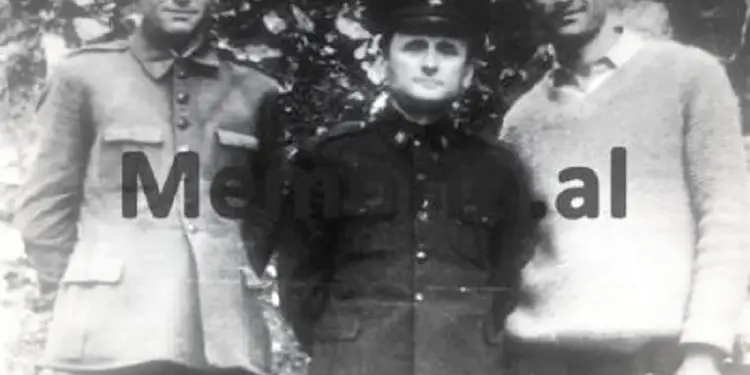
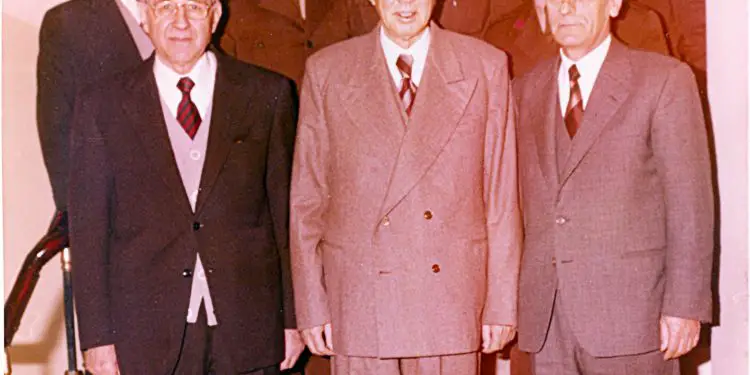
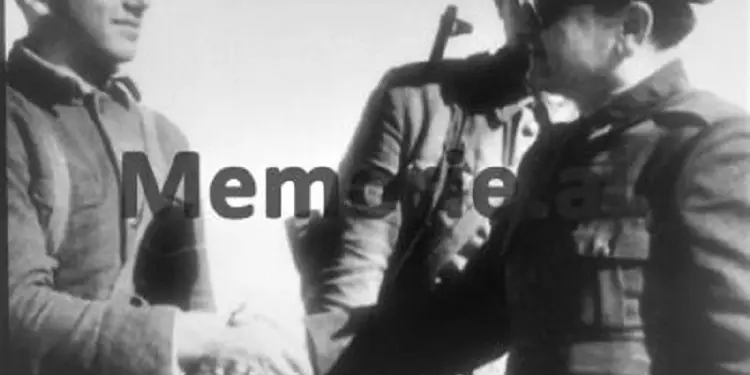
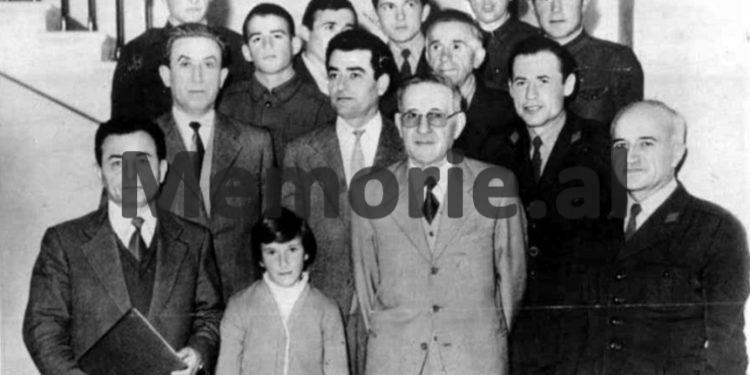
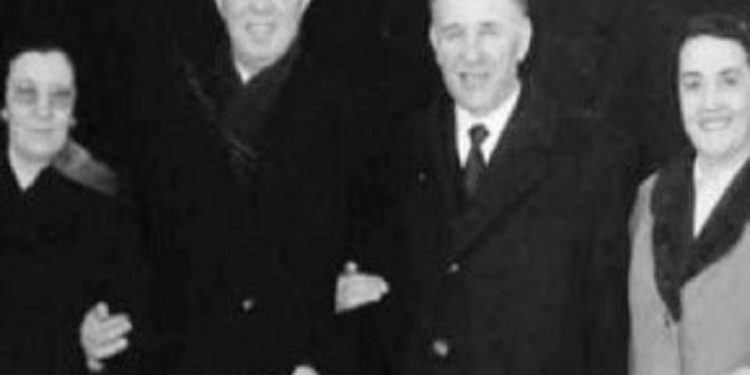
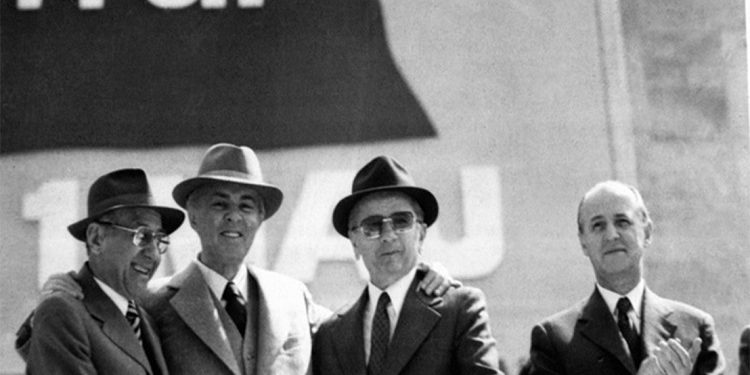
![“When the party secretary told me: ‘Why are you going to the city? Your comrades are harvesting wheat in the [voluntary] action, where the Party and Comrade Enver call them, while you wander about; they are fighting in Vietnam,’ I…”/ Reflections of the writer from Vlora.](https://memorie.al/wp-content/uploads/2025/06/admin-ajax-4-350x250.jpg)


![“The ensemble, led by saxophonist M. Murthi, violinist M. Tare, [with] S. Reka on accordion and piano, [and] saxophonist S. Selmani, were…”/ The unknown history of the “Dajti” orchestra during the communist regime.](https://memorie.al/wp-content/uploads/2026/02/admin-ajax-3-350x250.jpg)
![“In an attempt to rescue one another, 10 workers were poisoned, but besides the brigadier, [another] 6 also died…”/ The secret document of June 11, 1979, is revealed, regarding the deaths of 6 employees at the Metallurgy Plant.](https://memorie.al/wp-content/uploads/2026/02/maxresdefault-350x250.jpg)

